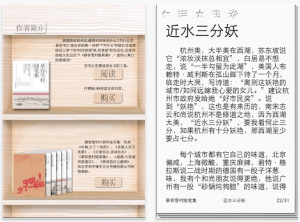China is not exactly known for having a watertight regime when it comes to piracy and copyright violations, but it’s trying to change that perception, and here’s a case in point: a group of eight authors, calling themselves the China Written Works Copyright Society, has won a case against Apple in Beijing for hosting apps that were in themselves violating the copyright on their works. Apple has in turn been ordered to pay 1 million yuan ($160,000) in compensation — pennies to the iPhone giant and only about 10 percent of how much the authors were trying to get out of Apple when they originally brought the case against it earlier in the year.
The news comes at an interesting time for Apple in China. The region — the world’s biggest smartphone market at the moment — is a significant one for Apple, accounting for 15 percent of all of its revenues. But it’s also facing huge competition, primarily from low-priced Android device makers. In Q4, Apple reported sales of $5.7 billion in Greater China, which was flat compared to Q3, but up 26 percent compared to a year ago. Apple has had also to grapple with contrasting (and not always positive) perceptions on how well its newest handset, the iPhone 5, has been selling in China since launching this month.
It also comes as China is making ever more moves to improve the connection between Internet users and real-world identities. However, it’s very much a double-edged sword. A law passed today requiring real-name identities for online users is one more way for China to track illicit content posters, but it could also be seen as a way for the country to further control how people use the Internet to express themselves, sometimes in acts of dissent against the country’s official lines of thought.
For their part, the China Written Works Copyright Society is unhappy with the amount of compensation ordered by the court.
“We are disappointed at the judgment. Some of our best-selling authors only got 7,000 yuan. The judgment is a signal of encouraging piracy,” a representative of the group told Reuters.
Still, the sum could be seen as significant winnings in a country where the average monthly wage for a working class person is $190. And it opens the door further for Apple to face yet more such claims from other rights holders in the country.
To date, this is the second time that Apple has lost a suit in China over copyright violations. In September, Apple had to pay 520,000 yuan (about $83,000) to the publisher of an encyclopedia over similar claims. As with all paid apps or in-app payments made through the App Store, Apple takes a 30 percent cut.
With hundreds and thousands of apps in app storefronts run by Apple and many others, there are plenty of examples of people ripping off (or riffing off of, if you’re open-minded) popular, copyrighted content. The question is whether China is going to make it easier for those who want to defend their rights to do so in courts.
The group that won the case against Apple, the China Written Works Copyright Society, may be a special case. It was suing based on 37 different works finding their way to the app store in unofficial apps, by well-known authors such as Han Han, Li Chengpeng, Cang Yue and Murong Xuecun. And they came to the case with prior experience. They had in 2010 been issued with a formal apology from Google for a similar offense (but without any publicly disclosed compensation); and in 2011, Baidu deleted 2.8 million works from its Wenku e-book portal, after a complaint by the group.
For its part, Apple has issued a statement (via WSJ) saying that it takes “copyright infringement complaints very seriously” and that it’s working on improving its service to help copyright owners better protect their content. It’s a two-way street for Apple, which has also faced copyright issues of its own over the iPad trademark as well as counterfeit device production.
